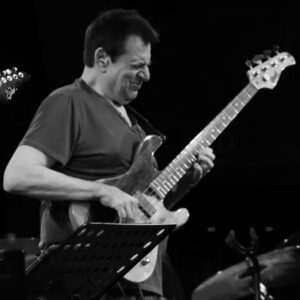Rudy’s Jazz Room (August 3)
Jeff Berlin Quartet with Don Aliquo, Bob Harsen, and Jody Nardone
Just as Rudy’s advertised, Jeff Berlin confirmed that he’s one of the leading innovators on electric bass, and has been so for nearly a half century. If he isn’t as well known to casual jazz fans as Stanley Clarke or Jaco Pastorius, who once remarked that Berlin was the better soloist, it’s probably because he wasn’t associated with the fusion “supergroups” that got started in the 1970’s like Return to Forever and Weather Report. In a way, this has been the largely hidden virtue of his career as he has traversed the worlds of prog-rock and jazz, including mainstream jazz, and not limited himself to what quickly became the cliched electric bass techniques of the fusion heyday, such as slap bass and two-handed tapping. It’s not as if audiences can’t hear traces of fusion devices in his playing, and certainly the art-rock aficionados will know about his time in King Crimson and Yes drummer Bill Bruford’s groups. But there’s so much more to his inventiveness that has continued to evolve and pass well beyond the vocabulary of the first-generation fusion bass heroes.
The two sets on Saturday, August 3, were anchored in the vocabulary of straight-ahead jazz and its standards like “Whisper Not,” “Groovin’ High,” and “Tenor Madness,” guided mostly by the democratic principle of turn-taking on solos and quartet members trading measures after Aliquo assertively articulated the themes on either tenor or soprano sax. Ironically enough, the least democratic song was Berlin’s unaccompanied medley of “The Star-Spangled Banner” and “America the Beautiful,” which was more of an exercise in tonal variety and bass voicings than an openly political statement. But if this one pure solo suggests how the bass can rise from the deep rhythmical foundations to the heights of melodic grace, it stood as an emblem of his part in the quartet. Just like Nardone’s responsive and quick-thinking piano lines, especially on one expansive blues number, the electric bass in the hands of a master like Berlin can easily morph from its complex time-keeping role to the leading voice in an otherwise acoustic combo.
After the quartet’s first set was over, I turned to the Belmont guitar professor sitting on my left in the front row and asked him how he liked Berlin’s playing up to that point. While both of us could easily settle on appreciative mainstays like “virtuosic” and “tour de force,” and I could have predicted that the jazz-meets-classical-guitar-and-then-some approach to bass playing would appeal to him, it’s almost easier to say what Berlin is not. Certainly not an exemplar of the “four on the floor” beat that early fusion absorbed from some of the 60’s funk groups and basic rock bands. Since we were probably not far from someone on Broadway playing in the thumbpicking style that Merle Travis brought to country guitar, I was tempted to make some completely irrelevant comparisons to an imaginary base line (no pun intended) for gauging guitar virtuosity. The best of the thumbpickers fuse alternating bass notes with syncopated melodic riffs that evoke ragtime patterns. But how to get a handle on Berlin, who famously disagreed with Nashville’s own Victor Wooten over a decade ago about the best methods for teaching electric bass? It’s not mastering a groove, which comes naturally over time, Berlin has said, but rather a conservatory-like approach to learning scales and appreciating the quality of each note in its larger matrix of harmony or melodic progression and knowing how to read music (seriously!). To see Berlin’s playing as mostly legato, as opposed to Jaco’s theatrical staccato pulses and vibrato effects, is one point of entry to appreciating his talents.
Considering that Berlin is headed to the Times Square jazz club Iridium next month to play with long-time collaborator Dennis Chambers on drums and pianist Michael Wolff, it was a privilege to watch him up close for over two hours in the intimate space of Rudy’s, which has the feel of a neighborhood jazz club despite the overbuilding that surrounds it in all directions. Berlin joked repeatedly about how his Nashville quartet is an ad hoc ensemble, ready to try anything, but it was evident throughout both sets that the other three members were more than qualified to keep up with his intricate rhythms and extended harmonic palette. He also was more than willing to give them ample space to take the lead and stay in the background when it was their turn, often subtly guiding the dynamic shifts between dense, aggressive solos and quietly reflective passages. This shift in dynamics was reflected in the song selections as well, with the driving bop standards interspersed with jazz waltzes and ballads that modulated the pace, with the characteristically propulsive Harsen switching over to brushes and a more textural sound. The winding mid-tempo lyricism of Steve Swallow’s “Falling Grace,” which vibraphonist Gary Burton first recorded in 1966, falls into this category. To hear Berlin take the lead on this song in a high, airy register of the bass with the most subtle handling of the strings was one of the highlights of the second set.



